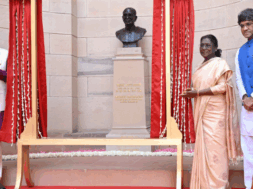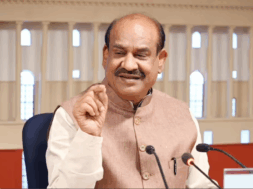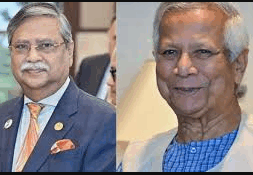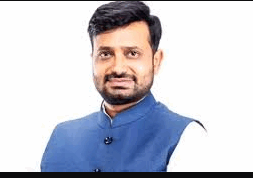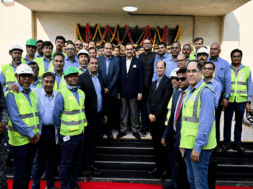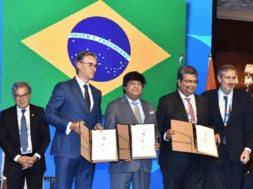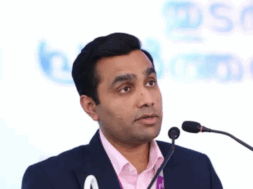
Torrent Group-supported UNM Foundation’s Abhivyakti Edition-6 brings to life India’s traditional art, music & dance on stage
Ahmedabad : Edition-6 of Abhivyakti – The City Arts Project, an endeavor of UNM Foundation of Mehta Family’s Torrent Group, brought together a diverse array of performances that captivated audiences of all ages, from the young to the elderly.
On Friday, unique expositions included contemporary dance infused with martial arts, the 17th century traditional music, experimental theatre and Indian classical dance forms such as Bharatnatyam, Kathak and Mohiniyattam enthralled the visitors with dynamism and diverse artistry.
Setting the tone for the evening was Gopal Agarwal & Aakash Vanzara’s Contemporary dance with Martial Arts themed “Territorial”. In their breathtaking performance, they explored the theme of man versus wild, focusing on how human encroachment threatens wildlife. Through a grey character, they highlighted the destruction caused by humans while acknowledging those who care about preserving nature. The performance called for a reflection on the need to protect our planet’s flora and fauna to ensure both – their survival and our own.
This was followed by the soulful melodies of traditional Betha Garba by Sharnam Vrund of singer Anupa Pota, which resonated deeply with the audience, evoking a sense of cultural pride and nostalgia. The 17th century musical form of Betha Garba is a cultural tradition of Naagar community, who practice this vocal form of music to worship their Kuldevi – Goddess during Navratri festival. The production aims to showcase the soulful invocation and installation of Mataji, preserving this age-old tradition.
‘Coming Soon’ a dark humour theatre by Devanshu Shah & Devang Nayak received thunderous applause as the audience associated with the common-man’s situational story behind the development chaos, land acquisitions and the emotions connected to it. The story is about a young man desperately needing money for his mother’s treatment finds out about his ancestral land, which is used as a graveyard. Navigating through ways of reclaiming his land for money, the play explored the balance between honouring the deceased and asserting property rights.
At the second venue in ATIRA, Dr Ayswaria Warriar performed her Tripoothu dance act. Dr. Ayswaria brought to life the sacred & rare festival which celebrates the menstruation of Goddess Parvati, through a mesmerizing Mohiniyattam Nritya Natika (Dance Ballet). The unique performance honoured the divine feminine and challenged the societal taboos surrounding menstruation. Through a blend of dance, music, and storytelling, the production gave and empowering experience to all including women audience.
On the platform performance, dancer duo Tarini Tripathi & Shalmali Zankar gave a spectacular performance of Kathak under the theme of Alokik. In the Indian classical dance piece, the duo attempted to explore Sankhya philosophy’s cosmic union of Prakriti (material) and Purusha (consciousness). The performance, centred on the union of Shiv and Parvati, illustrates the philosophical tenets of creation, existence & liberation, highlighting the interplay of these forces in human experience. Rooted in the traditional form of Kathak, they highlighted a narrative that can be found in one’s journey through the cosmos.
The audience received another spiritual experience in Priyank Upadhyay’s theatre performance “Shunyavatar”. It questioned one’s existential question on “Who are You?” & can you say that without your name, profession, culture, etc.? This concept is a journey of an Individual, trying to un-layer the self and wake up from the sleep he has always been choosing, the sleep of the consciousness. He has been sedating himself with countless things so that he doesn’t have to face the ultimate reality of consciousness i.e. who they really are.
In her gripping performance, Hiral Balsara blended Indian classical dance form of Bharatnatyam with modern Aerial Dance, to narrate the concept titled ‘The Untold’. The concept revolved around prostitution and how a prostitute goes on to become a mother. The story then talks about the prostitute who becomes a mother and how she deals with society. It also portrays the child’s journey and how they deal with society while growing up.
Twin sisters Mousam & Malka Mehta presented ‘Hori Ke Rasia’ the folk tradition of Vrindavan leaving the audience spell-bound with the performance. The twin sisters beautifully showcased how Krishna has many leelas, and the lovers of these leelas are also different, such as Faag, Basant, Nagdamana, Hindola, Baal Leela etc. Here, they present the lovers of Faag, which begins before Holi and continues for 40 days. These folk songs are sung in the language of Braj and based on different raagas like Pilu, Noor Sarang, Kafi etc. The audience slipped into the feelings of Radha, Gopis as they enjoyed Rasia with Krishna, by getting immersed in the divine sport of Krishna.
The evening concluded on a light-hearted note with a humour theatre performance by writer, director Chetan Daiya giving everyone a heartful of laugh and leaving them with thoughts to ponder over the social issues. Daiya’s theatre “Welcome Bhurabhai”, narrated the story of a corrupt chairman of a deteriorating housing society, seeking personal gain and inviting a foreign friend. To impress his guests, he hides poverty and neglect, embezzling funds for renovations.
The diverse lineup of performances at both the Venues ensured that there was something for everyone, making it a truly inclusive experience. At the display of Visual Art installations, Saakshi B. Shah & Chaitanya Tank displayed Swashray – a canvas of thoughts presenting a collection of thought-provoking reflections. Each piece offers a unique lens to explore, shaping your identity and setting you apart. Saakshi believes that these reflections can resonate with one’s experiences and reveal something about an individual. She encourages the viewer to engage with her art and celebrate the diverse perspectives that make us who we are.
Another installation that grabbed the visitors’ attention was Metamorphosis: A Visual Exploration of Urban Slum Challenges by visual artist Himalay Boruah from Dibrugarh, Assam. Inspired by his lush hometown, he creates artworks that capture the essence of nature. The creative installation highlighted the challenges faced by residents of neglected urban slums. The building, a metaphor for these challenges, becomes a canvas depicting the harsh realities of life in an impoverished community. The deteriorating facade, with cracked walls, weathered paint, and broken windows, reflects the community’s resilience and strength. By engaging with the artwork, the artist invites you to reflect on the resilience of marginalized communities, the urgent need for social and environmental justice, and the potential for positive transformation in the face of adversity.
Another artist from North-East, Kshetrimayum Gopinath Singh from Imphal, Manipur, presented “Echoes of Loktak” captured the serene beauty of Loktak Lake and the endangered Sangai deer. The lake sustains livelihoods yet faces environmental challenges. The Sangai, found only in Loktak, embodies both the pride and the struggles of Manipur. As observed, “places of great beauty often witness conflict.” Singh explores this paradox, highlighting how Manipur’s landscape bears the weight of both natural beauty and human conflict. The audience entry is open-to-all on ‘first come, first served’ basis. The programme schedule for the Pre-event is as follows:
| Performance Schedule for 23nd November 2024. Visual Arts Display Open from 5 pm onwards. | ||||
| Venue | Artists | Theme | Art Form | Time |
| Amphitheatre – GU Campus | Jaimil Joshi | Borderlands | DANCE – Contemporary with Classical Vocabulary | 07:15 pm |
| Auditorium – GU Campus | Tushar Sharma | 99 Days -Humour & Drama | Theatre | 07:15 pm |
| Manch – GU Campus | Smit Bhatt | Thappo | Music – Contemporary | 07:15 pm |
| ATIRA | Rakesh Wani | Anant Lay – Rhythm Fusion | Music | 07:15 pm |
| Platform GU | Ragi Khambhalvi | Char Bait Gujarati | Music – Folk | 08:30 pm |
| Platform ATIRA | Mansi Modi | Funambulism | Dance – Street Art | 08:30 pm |
| Amphitheatre – GU Campus | Rajoo Barot | Rang Bhoomi Na Sadabahar Geeto | Music – Traditional folk | 09:30 pm |
| Auditorium – GU Campus | Bhagwat Prajapati | Dway (A Journey of Eti-Neti) | Dance – Indian classical & contemporary | 09:30 pm |
| Manch – GU Campus | Mukt Band | The Palette Of Time | Music – Fusion rock | 09:30 pm |
| ATIRA | Ananya Vaidya | Vahi Kahani, Phir | Theatre – Modern folk experimental | 09:30 pm |

